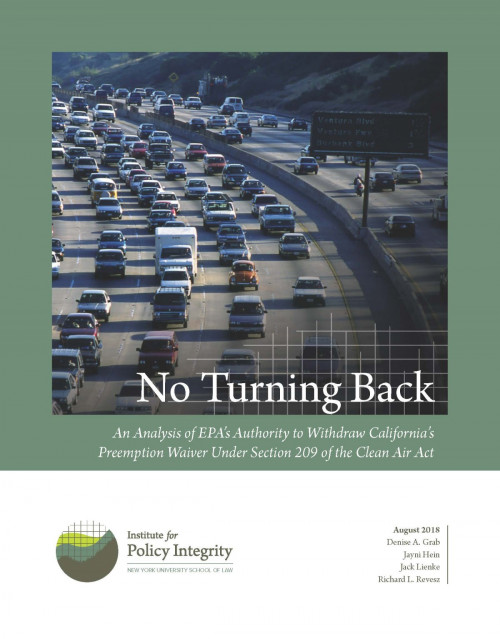-
Comments on the Family Detention Rule
A recently proposed rule would allow the Department of Homeland Security to indefinitely detain immigrant children who enter the U.S. in the company of a parent or guardian. Under current law, such children must be released or transferred to a non-secure, state-licensed facility within 20 days. We filed comments critiquing the Department’s assessment of the costs and benefits of this policy change.
-
Comments on FERC’s Potential Reforms to PJM Capacity Market
After suggesting that state policies subsidizing clean energy are distorting capacity markets, the Federal Energy Regulatory Commission (FERC) is exploring reforms to the capacity market in PJM – the grid operator serving 13 states and Washington D.C. FERC’s reforms have the potential to undermine state policies that address climate change, such as Renewable Energy Credits and Zero Emissions Credits (we discuss this issue in depth in a recent report). We submitted comments to FERC and reply comments on the proposals.
-
Comments on Carlsbad Region Fossil Fuel Leasing
We submitted two sets of comments to the Bureau of Land Management (BLM) in response to their Draft Resource Management Plan (RMP), which focuses on mineral development potential in the Carlsbad region of New Mexico. Our comments recommend that BLM not offer more lands for fossil fuel leasing, but instead consider alternatives with the greatest amount of conservation and wildlife protection. In particular, we focus on shortcomings in the RMP’s analysis and its failure to monetize climate damages.
-
Comments on Proposed Clean Power Plan Replacement
EPA recently issued a proposal to replace the Clean Power Plan (CPP) with a far weaker rule that will increase greenhouse gas and soot- and smog-forming emissions from the electric sector. Our comments explain why repealing the CPP is unnecessary, irrational, and harmful.
-
Comments on Proposed Weakening of Vehicle Emissions Standards
In August 2018, the Trump administration issued a proposal to dramatically weaken federal emissions standards for cars and light trucks, and to revoke the waiver that allows California to set its own standards. Federal emissions standards have been enormously successful at reducing greenhouse gas pollution and lowering fuel costs for consumers, and we recently submitted five separate sets of comments detailing the flaws with the Trump administration’s proposal.
-

No Turning Back
An Analysis of EPA’s Authority to Withdraw California’s Preemption Waiver Under Section 209 of the Clean Air Act
For 50 years, California has enjoyed unique authority to regulate air pollution from newly manufactured motor vehicles. While the Clean Air Act preempts all other states from setting their own vehicle emission standards, California can request a waiver to do so if it determines that its standards are at least as protective of public health and welfare as federal standards issued by the U.S. Environmental Protection Agency (“EPA”). Once a waiver is granted, other states can adopt California’s more stringent vehicle emissions standards as their own. EPA has now proposed to withdraw the waiver California received in 2013 to set its own greenhouse gas emission standards. Because a waiver withdrawal would be entirely unprecedented, neither courts nor legal scholars have previously had cause to discuss the circumstances, if any, under which a waiver might permissibly be withdrawn. This report analyzes whether EPA possesses revocation authority and, assuming it exists at all, when and how such authority may be exercised. It is an update to the August 2018 version of the same report.
-
Comments to the California Air Resources Board on its Cap-And-Trade Program
The California Air Resources Board (ARB) is extending and changing its cap-and-trade program for greenhouse gases. We recently submitted comments that outline ways the ARB can improve its proposed updates.
-
Comments on New Jersey’s Energy Master Plan
New Jersey is revising its Energy Master Plan (EMP) for 2019. In advance of the first draft of the plan, the New Jersey Board of Public Utilities, along with other state agencies, formed a committee to engage with stakeholders on the contours of the new plan. We submitted comments to the EMP Committee with a number of recommendations. Specifically, in drafting the 2019 EMP, we advise the Committee to consider grid resilience in a holistic manner and apply cost-benefit analysis to resilience plans and investments; adopt a granular approach to rate design, rather than use net metering; and design an incentive structure for energy storage operators to ensure that the use of energy storage systems reduces greenhouse gas emissions. These recommendations draw upon several of our recent publications on electricity policy, including reports on grid resilience and energy storage, and an academic article, also on energy storage. The first draft of the EMP is scheduled to be released this winter.
-
Expert Testimony on Colorado’s Low Emission Vehicle Program and the Social Cost of Carbon
We recently submitted expert testimony on the benefits of Colorado’s proposed Low Emission Vehicle Program. The LEV program could avoid millions of tons of greenhouse gas emissions, and we explain to the Colorado Air Quality Control Commission the importance of and methodology for monetizing the real-world contributions of those emissions to global climate change. Our report shows, by applying Social Cost of Carbon estimates, that Colorado’s proposed LEV program could generate billions of dollars’ worth of climate benefits.
-
Comments to BLM on Wright Area Coal Lease Extensions in Wyoming
The Bureau of Land Management (BLM) recently published a draft environmental assessment (EA) of coal lease extensions in the Wright Area of Wyoming. BLM’s new analysis reaffirms its 2010 environmental impact statement (EIS) on the same lease extensions despite a court order instructing BLM to correct false assumptions of coal leasing economics.. We submitted comments describing how the agency fails to improve its analysis and instead makes the same critical omissions and mistakes.






